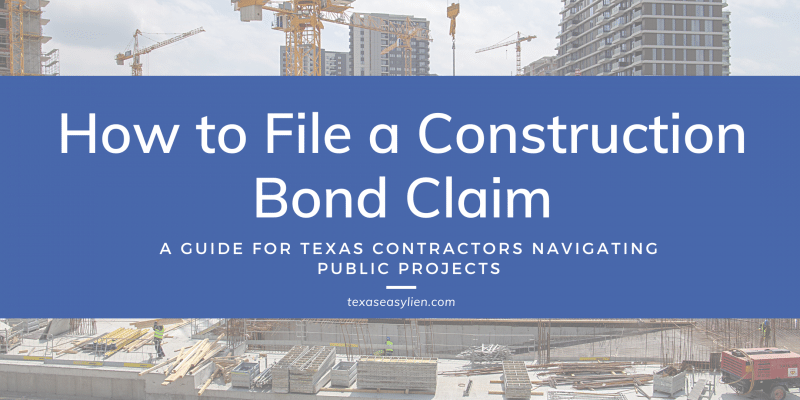
Labor shortages, delays, building inspectors—we all know problems are common in construction. The last thing you want to deal with is trouble getting paid. But sometimes, it happens, and if you work on public projects, you need to understand construction bonds.
You can file a mechanic’s lien on real estate if your company isn’t paid for work or supplies on that property. But liens can’t be placed on public property such as libraries, parks, schools, and highways. Instead, you need to file a bond claim.
In Texas, general contractors must have a construction bond to bid on most public construction projects. This article discusses work on property owned or leased by government entities like cities, counties, and the State of Texas.
This information doesn’t apply to work for the federal government, which includes military bases, national parks, post offices, and more.
Construction bonds may be new for you, so here are the essential facts and answers to the most commonly asked questions about construction bond claims:
- What is a construction bond?
- What is a construction bond claim?
- How does a construction bond claim differ from a construction or mechanic’s lien?
- Who can file a construction bond claim?
- What is a public works project?
- What information will I need to file a bond claim?
- How do I file a bond claim?
- What are the deadlines to file?
- What happens after I file a bond claim?
- Do I need an attorney to file a construction bond claim?
What is a construction bond
A construction bond is a type of insurance that protects against losses if a contractor fails to fulfill their payment obligations on a project. A surety company issues the bond and assumes the responsibility of paying the debt if the general contractor defaults or cannot make the payments.
Three main types of construction bonds include bid, performance, and payment.
A third-party surety company secures the payment bond that holds the funds responsible for ensuring the subcontractors and materials suppliers get paid. This way, the government-owned property does not get tied up in legal claims when contractors or material suppliers seek past-due payment.
What is a construction bond claim?
f a bond claim is submitted correctly, guaranteed funds are available to satisfy a subsequent judgment. This legal claim notice provides information about the job, type of contract, money owed, and a sworn statement of account.
These forms must be notarized and delivered to the surety company and to the contractor owing the money.
How does a construction bond claim differ from a construction or mechanic’s lien?
Generally speaking, you can’t file a lien on publicly (government) owned property, so a mechanic’s lien is not an option on public construction projects.
Instead, the law protects subcontractors and suppliers from non-payment with a construction bond called a payment bond. The bond guarantees that the prime contractor will pay all subcontractors, equipment lessors, and suppliers for the services and materials provided.
Fortunately for the subcontractors, the prime contractor is required, in most cases, to secure this bond before work begins. If you submit a written request in Texas, the contractor must give you a copy of the bond document within ten days. It’s a good idea to get this before you start work so you’ll have the details you might need, including the bond number and the name and address of the surety company.
Who can file a construction bond claim?
If you’re working on a public works project, most subcontractors, second-tier subcontractors, material suppliers, and laborers can file a bond claim if they aren’t paid when the contract specifies.
What is a public works project?
When the owner of the construction project is a governmental entity, such as the state, city, or county, it is called a “public works” project. Read the definition of a governmental entity in the Texas State Statutes CHAPTER 2253. PUBLIC WORK PERFORMANCE AND PAYMENT BONDS.
Typical examples are government offices, sewers, roads and bridge construction, public schools, public universities, government property, public parks, utility work (if publicly owned), and bus stations.
Remember, this discussion does not include projects on land leased or owned by the federal government.
What information will I need to file a bond claim?
Texas construction law has specific requirements for filing a construction bond claim—much like a mechanic’s lien. You must include detailed project information and meet the deadlines for submitting the bond claim paperwork.
We recommend getting these details before work begins on the project. If you didn’t get it before, collect this information now.
- Project Information: Owner, name of the project, project address or legal property description;
- Contract: Name (or company name) and mailing address of the General (Prime) Contractor, the amount, retainage amount, and type of agreement (written or oral);
- Bonding company (surety): Company name, address, and preferably, the bond number (you can still file if you have the surety company name and address, but not the bond number);
- Work: Invoices, description of the unpaid work performed, and the amount owed for each month (individually).
How do I file a bond claim?
When preparing the construction bond claim paperwork, the sworn statement of account must be notarized. Send copies of this statement, the bond claim notice, unpaid invoices and the contract to the general contractor and to the surety company by certified or registered mail. Although it is no longer required, we recommend mailing the documents with return receipt requested and keeping the return receipt with your files.
Submitting the bond claim notice and sworn statement of account will typically motivate the contractor to pay.
However, if after 60 days of mailing the bond claim, the amount is still due, it’s time to hire an attorney and file a lawsuit against the bond (surety) and the prime contractor for the unpaid balance and for attorney fees. Your time limit to sue is within one year from the date of the bond claim was mailed. If you do not file suit within this time, your claim against the bond will expire and cannot be renewed.
Please note that these rules only apply to domestic government projects in the State of Texas and do NOT apply to federal construction projects.
What are the deadlines to file a construction bond claim?
The bond claim deadlines and notice requirements are similar to the mechanic’s lien. We have an easy-to-follow table specifying notice and Texas bond claim deadlines for each month according to your role in the construction project.
Subcontractors must send notice of a bond claim with a sworn statement of account by the 15th day of the 3rd month after the month the work was performed or the materials were delivered.
What happens after I file a bond claim?
However, after 60 days, if the amount is still unpaid, file a lawsuit against the bond. In this case, the surety company will use the guaranteed funds available to satisfy a subsequent judgment.
Your time limit to do so is within one year from the date of the bond claim. If you fail to file a suit within this time, your claim against the bond will expire.
Typically, filing the bond claim motivates the contractor to pay. If not, and you submitted the claim correctly, the surety company can process your claim.
Do I need an attorney to file a construction bond claim?
You do not need to hire an attorney. Although filing a construction bond may seem complicated, Texas Easy Lien provides all the necessary documents, online notarization, and mailing requirements to pursue a bond claim quickly, easily, and affordably.
Just answer a few simple questions at www.texaseasylien.com to get started, and you will soon be on your way to recovering the money you’re owed.
Now, you know your right to file a construction bond claim notice and get your invoices paid faster. Your action can get the contractor’s attention and provide the leverage you need to get the payment you deserve.
Don’t be reluctant to assert your rights. The law of construction bond claims was made to protect you, and Texas Easy Lien is here to help.



